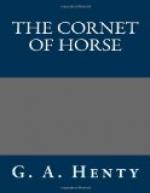With a deep bow, and a manner far more respectful and distant than that which nowadays would be shown to a stranger who was worthy of all honour, Rupert Holliday left his mother’s presence.
“I know what she wants,” Rupert muttered to himself. “To stop my fencing lessons; just as if a gentleman could fence too well. She wants me to be a stiff, cold, finnikin fop, like that conceited young Brownlow, of the Haugh.
“Not if I know it, madame ma mere. You will never make a courtier of me, any more than you will a whig. The colonel fought at Naseby, and was with the king in France. Papa was a tory, and so am I.”
And the lad whistled a Jacobite air as he made his way with a rapid step to the stables.
The terms Whig and Tory in the reign of King William had very little in common with the meaning which now attaches to these words. The principal difference between the two was in their views as to the succession to the throne. The Princess Anne would succeed King William, and the whigs desired to see George, Elector of Hanover, ascend the throne when it again became vacant; the tories looked to the return of the Stuarts. The princess’s sympathies were with the tories, for she, as a daughter of James the Second, would naturally have preferred that the throne should revert to her brother, than that it should pass to a German prince, a stranger to her, a foreigner, and ignorant even of the language of the people. Roughly it may be said that the tories were the descendants of the cavaliers, while the whigs inherited the principles of the parliamentarians. Party feeling ran very high throughout the country; and as in the civil war, the towns were for the most part whig in their predilection, the country was tory.
Rupert Holliday had grown up in a divided house. The fortunes of Colonel Holliday were greatly impaired in the civil war. His estates were forfeited; and at the restoration he received his ancestral home, Windthorpe Chace, and a small portion of the surrounding domain, but had never been able to recover the outlying properties from the men who had acquired them in his absence. He had married in France, the daughter of an exile like himself; but before the “king came to his own” his wife had died, and he returned with one son, Herbert.
Herbert had, when he arrived at manhood, restored the fortunes of the Chace by marrying Mistress Dorothy Maynard, the daughter and heiress of a wealthy brewer of Derby, who had taken the side of parliament, and had thriven greatly at the expense of the royalist gentry of the neighbourhood. After the restoration he, like many other roundheads who had grown rich by the acquisition of forfeited estates, felt very doubtful whether he should be allowed to retain possession, and was glad enough to secure his daughter’s fortune by marrying her to the heir of a prominent royalist. Colonel Holliday had at first objected strongly to the match, but the probable advantage to the fortune of his house at last prevailed over his political bias. The fortune which Mistress Dorothy brought into the family was eventually much smaller than had been expected, for several of the owners of estates of which the roundhead brewer had become possessed, made good their claims to them.




